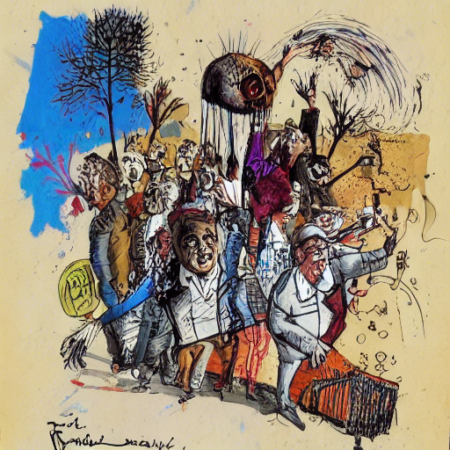Category: Art
Stack of conditions
Created with DiffusionBee, a GUI for Stable Diffusion. Prompt: kaleidescopic images of merging and overlapping optical illusions, as perceived by someone with vertigo having an LSD overdose and viewing the room through a fisheye lens or curved mirror
Imagination
Created with DiffusionBee, a GUI for Stable Diffusion. Prompt: “The images inside John Milton’s head when he imagined Satan’s revolt against god and downfall into hell”
inflamed
Created with DiffusionBee, a GUI for Stable Diffusion. Prompt: “dark oil painting entitled: ‘I will burn you with my laser eyes'”
let us not stray from comprehensibility
Created with DiffusionBee, a GUI for Stable Diffusion. Prompt: “writing a human reader will understand”
Dr. Gonzo
Created with DiffusionBee, a GUI for Stable Diffusion. Prompt: “phd student in year 10, in the style of Wassily Kandinsky”
the fall of Icarus drawn in crayon
Created with DiffusionBee, a GUI for Stable Diffusion. Prompt: “the fall of Icarus drawn in crayon”
Mastery
Created with DiffusionBee, a GUI for Stable Diffusion. Prompt: “watercolor painting: the Master of Seduction”
Prompt: “watercolor painting: the male Master of Seduction”
Abstract representation
Created with DiffusionBee, a GUI for Stable Diffusion. Prompt: “phd student in year 10, in the style of Wassily Kandinsky”
With sustained Dali labour
Created with DiffusionBee, a GUI for Stable Diffusion. Prompt: “phd student in year 10, in the style of Salvador Dali”










